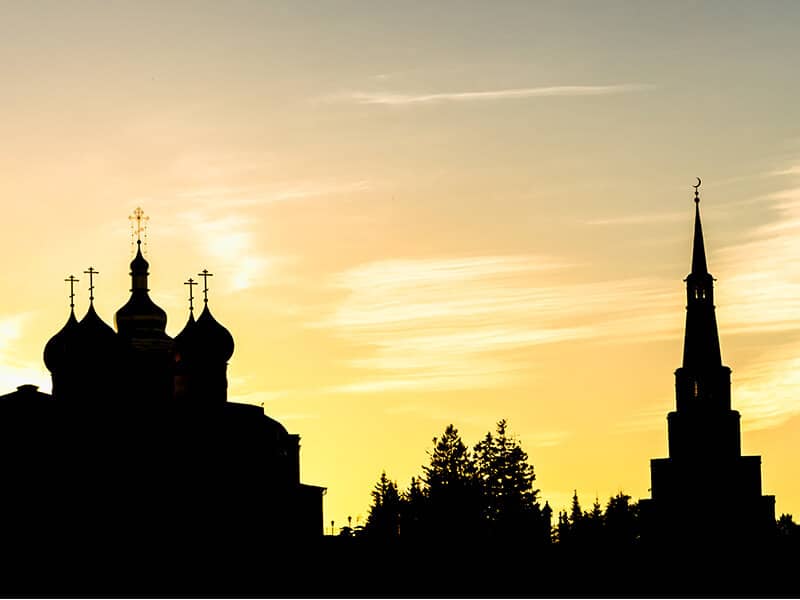Alam, now a 24-year-old Pakistani American living in Washington, D.C., got hundreds of responses from Muslims from around the globe. Some condemned homosexuality, but mostly people wanted to talk about how to reconcile being gay or lesbian with their religion.
Islam, like many religions, condemns homosexuality. In many Islamic countries, same-sex acts are punishable by harsh fines, jail, public whipping or death.
Beginning today, members of the Al-Fatiha Foundation, the organization Alam started in 1998, will gather in San Francisco for a three-day conference under the banner "Reclaiming Our Faith and Reigniting Our Spirit." Alam's group has between 1,500 and 2,000 members who belong to nine chapters in the United States, Canada and England. The group will cap its conference by marching in Sunday's Gay Pride Parade.
"I've heard over and over you can't be gay and Muslim," Alam, who came to San Francisco for the convention, said during a recent interview at a Castro district cafe. "It's an oxymoron. Sex is a taboo in our families, our communities and in our mosques. Now, we can point to Al-Fatiha, where we can address our issues and put a face to it."
Islam is one of the fastest-growing religions in North America, with an estimated 6 million American Muslims. Alam and members of Al-Fatiha see themselves as part of a younger generation of U.S. Muslims who are struggling against oppressive tradition and stereotypes.
But the mere existence of the group upsets orthodox members of the Islamic faith.
"I ask those people to repent, turn to God and take Islam seriously," said Muzammil Siddiqi, president of the Islamic Society of North America and the director of the Islamic Society of Orange County in Garden Grove. "Being gay and Muslim is a contradiction in terms. Islam is totally against homosexuality. It's clear in the Koran and in the sayings of the prophet Mohammed."
Siddiqi said he did not condone violence against gays, but supported laws in countries where homosexuality is punishable by death. As in the Bible, Siddiqi said, the Koran includes the story of Lot, in which men who have sex with men are punished.
"How can people accept something that is against the Koran, unless Muslims stop being Muslims?" Siddiqi said.
Now residing in New Jersey, Heydari attends support groups for parents of transgendered children. She also participates in Internet groups where parents share their stories.
"I believe Islam, on its own, is not bad," said Heydari, 54. "But governments and religious parties in different countries have somehow taken advantage of loopholes to exercise their pressure against certain groups. We are ready to sacrifice the health of a child for the sake of society."
Her daughter's sexual orientation is still concealed from her husband's family in Iran.
Heydari said groups such as Al-Fatiha broaden people's minds, here and abroad.
"I don't think God wants any of his subjects to be punished or put in isolation," she said. "My daughter was born with this issue. It doesn't make her any different. As a parent, I don't love her any less."
Pakistan-born Surina Khan, the 33-year-old executive director of the San Francisco-based International Gay and Lesbian Human Rights Commission, said gay Muslims were not alone in trying to find room to practice their faith in a hostile environment. Gays from conservative Protestant, Catholic and Jewish denominations have struggled for decades to worship God while accepting their homosexuality.
Al-Fatiha used Dignity/USA, a group for gay, lesbian, bisexual and transgendered Catholics that began in 1973, as a role model for its programs and mission.
Khan, who is not religious but was raised in a Muslim family, was disowned by her mother and brother when she came out as lesbian 12 years ago.
Eventually, "they came to realize family is an important institution," she said. "It took a lot of education and conversation.
"I believe in everybody's right to religious freedom, but also that no one has the right to impose their beliefs on anyone else," Khan said. "Islam is a very tolerant religion. It just depends on whether you view it with a progressive perspective or a fundamentalist perspective.
"One of the most liberating experiences in my life has been to live with integrity, honesty, with family and friends."
In addition to the nine chapters, Al-Fatiha has a half-dozen Internet list servers, where people talk about dating, practicing their faith and cultural traditions, and dealing with disappointed parents. Its Web address is www.al-fatiha.net.
"All of us realize how important it is to create dialogue," Alam said. "That's why we gave this year's conference the theme 'Reclaiming Our Faith.' We're connecting with our faith and spirit, which is not allowed in orthodox circles. We allow that. We bring that out."

